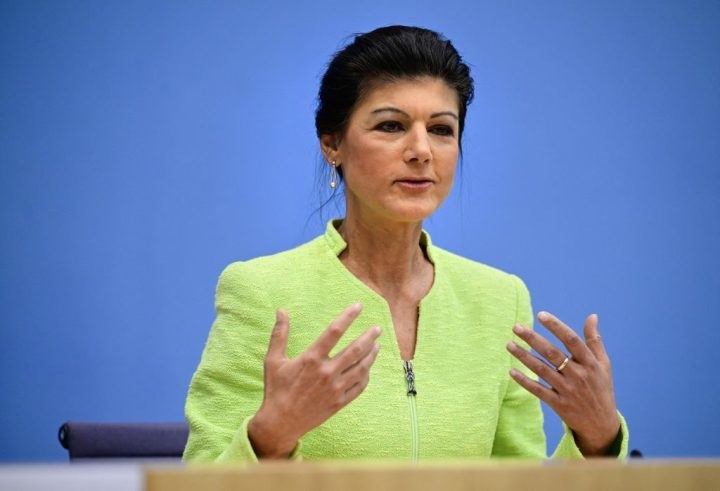Sahra Wagenknecht, a pivotal figure of the German left, has decided to go up against her former party by launching a new protest movement. Today, Wagenknecht gave a press conference announcing that she was leaving the Die Linke Party to run an organization called the “Sahra Wagenknecht Alliance.” She argued that Germany’s infrastructure was in a bad way and warned that the country faces a loss of prosperity if, among other things, it does not give up on its dogged pursuit of green policies. “Things cannot continue the way they are currently going,” she said.
Over the past decade, Wagenknecht has become one of the most well-known left-wing politicians in Germany, regularly assuming anti-capitalist positions and thereby becoming an icon of the extreme left. Due to her demeanor, persona and even her hairstyle, she has been compared to Rosa Luxemburg, a founding member of Germany’s Communist Party who in 1919 was murdered by members of a government-sponsored paramilitary group.
Wagenknecht has targeted the same anti-establishment voters as the right-wing Alternative for Germany
In recent years, Wagenknecht has fallen out with her party, Die Linke, over her stance on the Fridays for Future environmental movement, identity politics, Covid-19 restrictions and her pro-Russia position. Her book The Self-Righteous drew a line between traditional left-wing politicians such as Jeremy Corbyn and those she calls “lifestyle leftists” — according to Wagenknecht, the latter dominated her former party. The book became a controversial subject among Die Linke officials; Wagenknecht faced calls to resign and even motions to oust her from the party in the past two years.
While the “Sahra Wagenknecht Alliance” is only a registered association and has yet to apply for the status of a political party, the launch of the party in September should be considered a declaration of war against her former party. The leadership of Die Linke has already agreed on an incompatibility clause, meaning that supporters cannot belong to both the party and Wagenknecht’s organization. Since founding the alliance, Wagenknecht’s own political status had been brought into question, as she had been a member of the German parliament for Die Linke since 2008. Today, Wagenknecht’s exit from the party meant she avoided being officially barred. Alongside her, nine other members of parliament departed from Die Linke.
Wagenknecht’s alliance intends to be “a strong protest movement that stands up against politics that neglects the wishes and interest of the people” while arguing that many Germans have “lost trust in the political class.” While she is a left-wing figure, Wagenknecht has targeted the same anti-establishment voters as the right-wing Alternative for Germany (AfD).
Whether her new alliance will be successful in the polls after being granted party status remains to be seen. Oscar Lafontaine, Wagenknecht’s husband, left the Social Democrats in 2005 and joined the newly formed left-wing Labor and Social Justice — The Electoral Alternative Party (WASG), which later merged with the party of Democratic Socialism, forming Die Linke. He will join the “Sahra Wagenknecht Alliance” too.
This isn’t the first time Wagenknecht has tried to launch a political movement. In 2018, she started an organization under the name of “Stand Up,” modeling it on Jeremy Corbyn’s Momentum and Jean-Luc Mélenchon’s La France Insoumise with the intention of having it serve as a left-wing collective movement. But the movement’s policies remained somewhat muddy because the organization was not only supported by left-wing figures but also by members of the Green and Social Democrat parties. While the organization technically still exists, it lost all of its steam after less than a year.
This time, though, Wagenknecht has put it all on the line. She may well find a sweet spot in Germany’s political landscape, targeting the anti-immigrant voters who disagree with some of the economic and social policies of the AfD. Her arguments against mass immigration and radical green regulation, and calls for the protection of the working class in Germany have the potential to resonate with this demographic. Working against the rise of the alliance is the element of the personality cult: the party political focus on one individual often leads to a downfall once the leadership loses charisma or stumbles publicly one way or another. Wagenknecht may be seeking the spotlight, but the question is whether her days in it have come to an end.
This article was originally published on The Spectator’s UK website.


























Leave a Reply